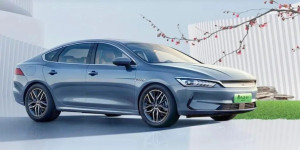A direct challenge to ICE vehicles and the Tesla Model 2
BYD’s unveiling of the Qin Plus EV Honor Edition marks a significant milestone in the electric vehicle (EV) industry, especially in the affordable vehicle segment. With models priced between 109,800 RMB to 139,800 RMB ($15,200 to $19,400), this saloon car directly challenges the dominance of internal combustion engine (ICE) vehicles in the low-cost market segment, offering a compelling alternative to popular models like the Toyota Corolla.
Key Specifications of the BYD Qin Plus EV Honor Edition
- Price Range: 109,800 RMB to 139,800 RMB ($15,200 to $19,400), making it highly competitive in the global automotive market.
- Power and Performance: The electric motor delivers up to 134 hp (100 kW) and 132 lb-ft (180 Nm) of maximum torque, ensuring a robust and responsive driving experience.
- Battery Options: Available with either a 48 kWh or 57.6 kWh lithium iron phosphate (LFP) battery pack.
- Driving Range: Offers up to 261 mi (420 km) with the 48 kWh battery and up to 316 mi (510 km) with the 57.6 kWh battery, based on the China Light-Duty Vehicle Test Cycle (CLTC), catering to both city commuters and long-distance drivers.
Implications for Tesla and the Upcoming Model 2
The BYD Qin Plus EV Honor Edition’s entry into the affordable EV market segment presents a notable challenge for Tesla, particularly as it prepares to launch its own affordably priced vehicle, the anticipated Model 2.
-
Pricing Pressure: Tesla’s Model 2, rumored to be in development with a goal of being the company’s most affordable EV at USD$25k, faces significant pricing pressure. Tesla will need to meet or exceed the value proposition offered by the Qin Plus EV, which has set a new benchmark for affordability in the EV space.
-
Performance and Range Expectations: With the Qin Plus EV offering substantial range and power at a low cost, Tesla’s Model 2 will need to deliver similar or better performance metrics to stay competitive. Tesla’s reputation for cutting-edge battery technology and drivetrain efficiency will be crucial in meeting these expectations.
-
Market Positioning: Tesla’s brand is synonymous with luxury and high performance. The introduction of an affordable model like the Model 2 will test Tesla’s ability to maintain its premium brand image while appealing to a broader market segment. Tesla will need to carefully balance these dynamics to ensure the Model 2’s success without diluting its brand equity.
-
Global Strategy: BYD’s success in China, the largest EV market globally, and its expanding international footprint, highlights the importance of Tesla’s strategy for the Model 2 in both existing and emerging markets. Tesla may need to adjust its market approach, especially in regions where BYD’s pricing and local market understanding give it a competitive edge.
-
Innovation as a Differentiator: To differentiate the Model 2 from the Qin Plus EV and other competitors, Tesla is likely to leverage its strengths in software integration, autonomous driving capabilities, and network of Superchargers. Innovative features that enhance the driving experience, improve safety, and offer convenience could justify a premium over competitors like BYD.
The BYD Qin Plus EV Honor Edition represents a watershed moment for the EV industry, challenging established norms about the affordability and accessibility of electric vehicles. Its competitive pricing, impressive range, and performance set a new standard in the low-cost EV segment. For Tesla, the arrival of the Qin Plus EV poses a strategic challenge and an opportunity to redefine what consumers can expect from an affordable electric vehicle. As the EV market continues to evolve, the competition between these two innovators will undoubtedly drive further advancements in technology, sustainability, and consumer value.

